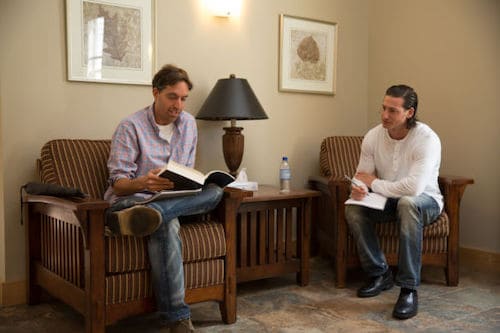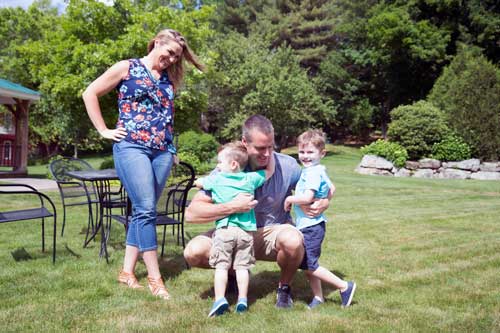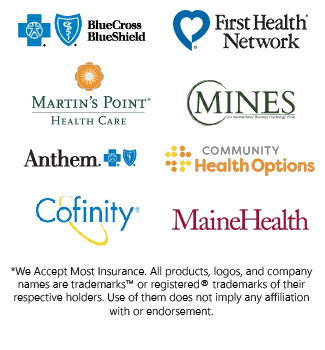
The Plymouth House Process
For two decades, The Plymouth House has been helping men & women find freedom from addiction through the 12 Steps of Alcoholics Anonymous. While The Plymouth House is not affiliated with Alcoholics Anonymous, we have found the 12 Steps to be an extremely effective tool for helping individuals transform their lives and maintain long-term recovery. At our beautiful retreat in the foothills of the White Mountains in New Hampshire, our guests are guided through the steps, while simultaneously benefiting from a wide range of world-class recovery services including: individual, group and family therapy with experienced professional therapists; life skills education; guided meditation and yoga classes; nutrition workshops and recreational activities. Our 7-acre campus sits on 60-acres of natural land with peaceful walking trails, a river and abundant trees. It is an idyllic place to seek spiritual, emotional, mental and physical healing from addiction.
The Plymouth House Process is a powerful combination of 12-Step work and therapy. Each phase of the process naturally progresses to the next. In the first phase — Residential Inpatient Treatment — guests work the first three steps of recovery. In the second phase — our Partial Hospitalization Program (PHP) — our guests work steps 4-7. These two phases complete our Primary Care Program. Following graduation from our Primary Care Program, our guests have the option to continue on with our Extended Care Program, volunteer for our Monitor Program, or participate in an outside Intensive Outpatient Program. The Plymouth House has wonderful relationships with several outside IOP program providers and is happy to help transition guests to those programs.
If The Plymouth House Process is completed thoroughly and wholeheartedly, guests will most assuredly experience a new sense of freedom, joy and purpose in their lives. They will transform.
Steps 1-3
What are the first 3 steps about?
- Admitting Powerlessness
- Believing There’s Hope
- Deciding To Do The Work
What does this phase look like?
- In the first phase of the process, guests work one-on-one with both a primary therapist and a 12-step contact to work the first three steps of the Big Book of Alcoholics Anonymous. Guests typically complete the first three steps in the first two weeks of our residential inpatient program.
Goals:
- Honesty
- Self Reflection
- Surrender
What Traditional Treatment Aligns to this Phase?

Surrender & Hope
Steps 1 – 3 Summarized
The first phase of The Plymouth House Process is to get through the first three steps of Alcoholics Anonymous. After our guests have arrived and settled in to their beautiful accommodations in the foothills of the White Mountains, our guests are introduced to both their primary therapist and their 12-Step Contact. A 12-Step Contact is like a professional sponsor and mentor who will guide individuals through the 12-Step process.
The First Step is to admit to oneself on a deep, heartfelt level, that left to their own devices, they have no power to overcome their addiction. An individual must feel their own powerlessness over their addiction. It is only by admitting complete defeat that an individual is then able to access the help and motivation they need to change.
The Second Step is to start believing that there is hope. By finding a power greater than oneself — whether that is the power inherent in the collective community of Alcoholics Anonymous, or in a spiritual force of one’s own understanding — each individual can come to believe in their ability to change. Believing there is hope is the essence of the second step.
The Third Step is making a decision to utilize this newfound higher power to continue the path of transformation. By surrendering one’s own self will — the thoughts and actions that have been causing their troubles — and exchanging it for a different path (the 12 Steps), an individual is able to begin the process of recovery.
Steps 4 – 7
What Happens in Steps Four – Seven?
- Each guest writes an inventory of their life
- Each guest shares their inventory with another person
- Each guest acknowledges their own faults
- Each guest becomes willing to let their defects go
How long do these steps take?
- Typically our guests complete Steps 1-7 by the time they graduate from our Partial Hospitalization Program, but timelines do vary. The speed at which one works the steps is determined by the individual, their 12-Step Contact and their therapist.
Goals:
- To Identify destructive patterns in our lives
- To explore the beliefs & defects that are blocking us from love, freedom, health & happiness
- To let go of resentment & find forgiveness
- To share our stories with another person
- To let go of harmful character defects
What Traditional Treatment Aligns to this Phase?

Humility & Willingness
Steps 4 -7 Summarized
Steps Four and Five are focused on self-reflection. The Fourth Step is to make “a searching and fearless moral inventory of ourselves.” Another word for “moral” is truth. By reviewing our lives — the people, situations, beliefs and fears we have engaged with in our past — we can begin to see the truth about ourselves and the roll we’ve played in our troubles. Through writing, we begin to see the patterns we have repeated over and over again, and the negative beliefs that have perpetuated those patterns. We begin to see ourselves clearly.
In Step Five, we read our written inventory to a trusted friend. By saying, out loud, the patterns we have revealed to ourselves on paper, we are symbolically releasing the baggage from our pasts. Our trusted friend can also help guide us to see events, people and beliefs from our past from a new perspective.
Steps Four and Five reveal to us what needs to change in ourselves to make lasting change in our lives. The fourth and fifth steps lead naturally to Step Six, which is to make a list of our character defects and become willing to let them go. These defects could be old beliefs that aren’t working for us (for example: “I’m incapable of love,” or “I’m not good enough” or “People will always leave”), or they could be personality defects such as being quick to anger, being judgemental, self-righteous or envious, being a perfectionist or a procrastinator, or holding too high of expectations of others. These defects are the blocks standing in the way of the love, relationships and life we desire. It might sound easy to let these go, but it can be difficult. Our defects sometimes have a payoff. For example, perhaps our self-righteousness gives us a sense of superiority. Giving up this defect might threaten our ego. In Step Six we become willing to let go of our defects — even the ones that have a payoff. In Step Seven we humbly ask our higher power to remove these defects. Oftentimes our defects are much like our addictions: out of our control. We need help to change. And Step Seven is where we ask for help.
Steps 8 – 12
What is addressed in Steps 8 – 12?
- Guests make a list of the people they have harmed
- Guests become willing to make amends to those people
- Guests begin to make amends
- Guests practice prayer & meditation
- Guests learn to practice the principles of the steps in all their affairs
- Guests begin to serve others
When do I do Steps 8 – 12?
- If, after graduating from the PHP program, a guest decides to continue their recovery in either our Extended Care Program or Monitor Program they will have an opportunity to complete all 12 Steps. If an individual decides to continue their treatment at an outside IOP program or returns home, it is still highly recommended they finish working the steps with a sponsor.
Goals:
- To make a list of all the people we have harmed
- To mend our relationships
- To gain a sense of self-confidence and personal integrity
- To grow our sense of self & deepen our spirituality
- To be of service to others
What Traditional Treatment Aligns to this Phase?
- Extended Care or Intensive Outpatient Program

Transformation
Steps 8 – 12 Summarized
In Step Eight we make a list of all the people we have harmed. We turn back to our fourth step inventory. We review the people listed on that inventory; then take a close look at the fourth column (which is where we have written down our own faults). We determine what individuals we have harmed and write down those names.
In Step Nine, we take the list and determine a way to make amends to those individuals. An amends is not merely a verbal apology — it is both an admission of wrongdoing, and the sincere intention to change the behavior in ourselves that caused such pain. Amends can come in many forms: they can be a sit-down apology; an honest, heartfelt letter; a financial reimbursement; an act of service; or what is called a “living amends’ — an agreement to live differently in the future. Our 12-Step Contact and our Higher Power will help us determine what amends we should make and how. If we have worked the previous eight steps thoroughly, we should be able to show up to our amends as a changed individual. The amends process can be a very healing process for both ourselves and our loved ones. By making amends we will find new self-confidence, a sense of personal integrity and intimacy with others.
Step Ten is to take a daily inventory of ourselves. At the end of our days, and periodically throughout our days, we review our conduct, attitude and beliefs. We look at where we may be acting selfishly, dishonestly, fearfully or with wrong motives. By staying self-aware, we are able to quickly spot when we are off track. This will prevent us from slipping back into our old ways.
Step Eleven is about strengthening our prayer and meditation practices. It is through prayer and meditation that we both speak, and listen, to our Higher Power. Step Eleven helps us get in conscious contact with that little voice inside us that helps guide our path.
Step Twelve is primarily about two things: number one, being of service to others; and number two, applying the principles we have learned by working the first eleven steps to our daily lives. By the time we reach Step Twelve, we should be very different people than when we first began. We should be more selfless, honest, compassionate and kind. We will want to help others find the freedom we have found in recovery.














